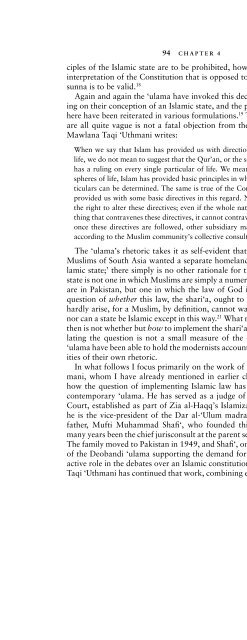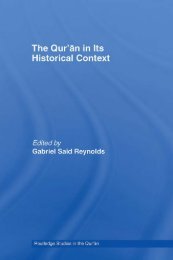Download (1 MB) - Islam and Christian-Muslim Relations: Articles ...
Download (1 MB) - Islam and Christian-Muslim Relations: Articles ...
Download (1 MB) - Islam and Christian-Muslim Relations: Articles ...
Create successful ePaper yourself
Turn your PDF publications into a flip-book with our unique Google optimized e-Paper software.
94 CHAPTER 4ciples of the <strong>Islam</strong>ic state are to be prohibited, however; <strong>and</strong> finally, nointerpretation of the Constitution that is opposed to the Qur’an <strong>and</strong> thesunna is to be valid. 18Again <strong>and</strong> again the ‘ulama have invoked this declaration in elaboratingon their conception of an <strong>Islam</strong>ic state, <strong>and</strong> the principles enunciatedhere have been reiterated in various formulations. 19 That these principlesare all quite vague is not a fatal objection from their viewpoint, for asMawlana Taqi ‘Uthmani writes:When we say that <strong>Islam</strong> has provided us with directions for all spheres oflife, we do not mean to suggest that the Qur’an, or the sunna, or <strong>Islam</strong>ic lawhas a ruling on every single particular of life. We mean, rather, that, in allspheres of life, <strong>Islam</strong> has provided basic principles in whose light all the particularscan be determined. The same is true of the Constitution. <strong>Islam</strong> hasprovided us with some basic directives in this regard. No human being hasthe right to alter these directives; even if the whole nation agrees on somethingthat contravenes these directives, it cannot contravene them. However,once these directives are followed, other subsidiary matters can be settledaccording to the <strong>Muslim</strong> community’s collective consultation. 20The ‘ulama’s rhetoric takes it as self-evident that the only reason the<strong>Muslim</strong>s of South Asia wanted a separate homel<strong>and</strong> was to have an ‘<strong>Islam</strong>icstate;’ there simply is no other rationale for this state. An <strong>Islam</strong>icstate is not one in which <strong>Muslim</strong>s are simply a numerical majority, as theyare in Pakistan, but one in which the law of God is implemented. Thequestion of whether this law, the shari‘a, ought to be implemented canhardly arise, for a <strong>Muslim</strong>, by definition, cannot want it any other way;nor can a state be <strong>Islam</strong>ic except in this way. 21 What merits consideration,then is not whether but how to implement the shari‘a. This way of formulatingthe question is not a small measure of the extent to which the‘ulama have been able to hold the modernists accountable for the ambiguitiesof their own rhetoric.In what follows I focus primarily on the work of Mawlana Taqi ‘Uthmani,whom I have already mentioned in earlier chapters, to illustratehow the question of implementing <strong>Islam</strong>ic law has been treated by thecontemporary ‘ulama. He has served as a judge of the Federal Shari‘atCourt, established as part of Zia al-Haqq’s <strong>Islam</strong>ization campaign, <strong>and</strong>he is the vice-president of the Dar al-‘Ulum madrasa of Karachi. 22 Hisfather, Mufti Muhammad Shafi‘, who founded this madrasa, had formany years been the chief jurisconsult at the parent seminary in Deob<strong>and</strong>.The family moved to Pakistan in 1949, <strong>and</strong> Shafi‘, one of the most ardentof the Deob<strong>and</strong>i ‘ulama supporting the dem<strong>and</strong> for Pakistan, played anactive role in the debates over an <strong>Islam</strong>ic constitution for the new state. 23Taqi ‘Uthmani has continued that work, combining extensive writings on



